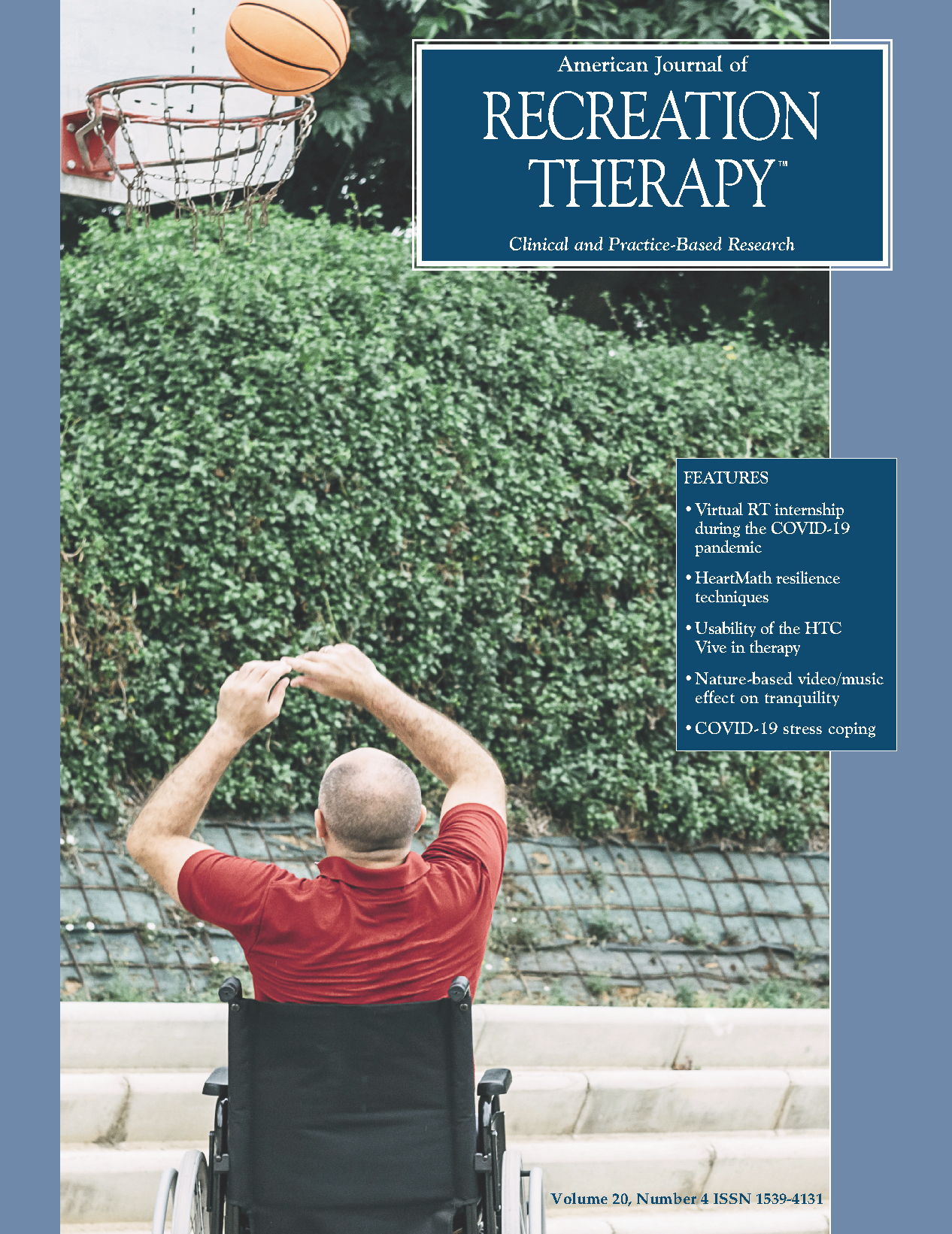Impacts of HeartMath techniques on undergraduate college students: A pilot study
DOI:
https://doi.org/10.5055/ajrt.2021.0242Keywords:
college students, coping, HeartMathAbstract
While stress is a normal part of a person’s life, it can negatively impact the health and well-being of that person if there is a consistent accumulation of tension. This research pilot study was conducted based on the stress that undergraduate students experience while in a typical semester. An educational intervention was given over a 4-hour period on HeartMath Resilience techniques. Each participant was given a pre- and post-test created based around the Health Belief Model. Results of the research were favorable in relation to HeartMath being a beneficial coping tool for stress as well as participants being confident in using those tools in future situations.
References
National Institute of Mental Health website: 5 Things you should know about stress. Available at https://www.nimh.nih.gov/health/publications/stress/index.shtml. Accessed April 28, 2019.
Mills H, Reiss N, Dombeck M: Types of stressors (eustress vs. distress). American Addiction Center website. Available at https://www.mentalhelp.net/articles/types-of-stressorseustress-vs-distress/. Accessed April 28, 2019.
Stress. Cleveland Clinic website. Available at https://my.clevelandclinic.org/health/articles/11874-stress. Updated February 5, 2015. Accessed April 28, 2019.
Stress in America: The state of our nation. Available at https://www.apa.org/news/press/releases/stress?tab=2. American Psychological Association website. Updated November 5, 2019. Accessed April 22, 2020.
Enrollment trends by age. National Center for Education Statistics website. Available at https://nces.ed.gov/programs/coe/pdf/coe_cea.pdf. Updated November. 2017. Accessed April 28, 2019.
Unemployment rates and earning by educational attainment. Available at https://www.bls.gov/emp/chart-unemployment-earnings-education.htm. United States Bureau of Labor Statistics website. Updated September 4, 2019. Accessed April 22, 2020.
Mental health and college students. Available at https://adaa.org/finding-help/helping-others/college-students/facts. Anxiety and Depression Association of America website. Accessed April 28, 2019.
5 main causes of stress for college students. College parents of America website. Available at https://collegeparents.org/2019/01/03/5-main-causes-of-stress-for-college-students%EF%BB%BF/. Published January 3, 2019. Accessed April 28, 2019.
The American Institute of Stress website: Stress in college students. Available at https://www.stress.org/collegestudents. Accessed April 28, 2019.
Kaplan-Leiserson E: Put your heart math into it. TD: Talent Dev. 2002;56(2):42. Available at https://web-a-ebscohost-com.proxy195.nclive.org/ehost/detail/detail?vid=0&sid=5c8b5eeb-1049-4b22-9fb6-5aff9193846b%40sessionmgr4006&bdata=JnNpdGU9ZWhvc3QtbGl2ZSZzY29wZT1zaXRl#db=aph&AN=6038829. Accessed April 28, 2019.
McCraty R, Shaffer F: Heart rate variability: New perspectives on physiological mechanisms, assessment of self-regulatory capacity, and health risk. Glob Adv Health Med. 2015; 4(1): 46-61. DOI: 10.7453/gahmj.2014.073
Heckman S, Lim H, Montalto C: Factors related to financial stress among college students. J Finan Ther. 2014; 5(1): 18-39. DOI: 10.4148/1944-9771.1063.
Kelley B, Baghurst T: An examination of stress in college students over the course of a semester. Health Promotion Pract. 2014; 15(3): 438-447. DOI: 10.1177/1524839913510316.
Saleh D, Camart N, Romo L: Predictors of stress in college students. Front Psychol. 2017; 8(19): 1-8. DOI: 10.3389/fpsyg.2017.00019.
Jones C, Jensen J, Scherr C, et al.: The health belief model as an explanatory framework in communication research: Exploring parallel, serial, and moderated mediation. Health Commun. 2015; 30(6): 566-576.
Glanz K, Rimer BK, Viswanath K: Chapter 3: Health Belief Model. In Glanz K, Rimer BK, Viswanath K (eds.): Health Behavior and Health Education: Theory, Research, and Practice. 4th ed. San Francisco, CA: Jossey-Bass, 2008, pp. 45-62.
Salkind NJ: Encyclopedia of Research Design (Vols. 1-0). Thousand Oaks, CA: SAGE Publications, Inc., 2010. DOI: 10.4135/9781412961288.
Lackey ED: Self-regulation and heart rate variability coherence: Promoting psychological resilience in healthcare leaders: A dissertation submitted in partial fulfillment of the requirements for the degree of Doctor of Philosophy in Values-Driven Leadership, 2014.
Weltman G, Lamon J, Chartrand D: Police department personnel stress resilience training: An institutional case study. Glob Adv Health Med. 2014; 3(2): 72-79. DOI: 10.7453%2Fgahmj.2014.015.
Edwards SD: Proceedings of Academics World 158th International Conference. In: Overview of heartmath coherence model in advancing health and medical science.
McCraty R: New frontiers in heart rate variability and social coherence research: Techniques, technologies, and implications for improving group dynamics and outcomes. Available at https://www.frontiersin.org/articles/10.3389/fpubh.2017.00267/full. Frontiers in Public Health. Published September 19, 2017. Accessed March 30, 2021.
Published
How to Cite
Issue
Section
License
Copyright 2000-2025, Weston Medical Publishing, LLC and American Journal of Recreation Therapy. All Rights Reserved.


